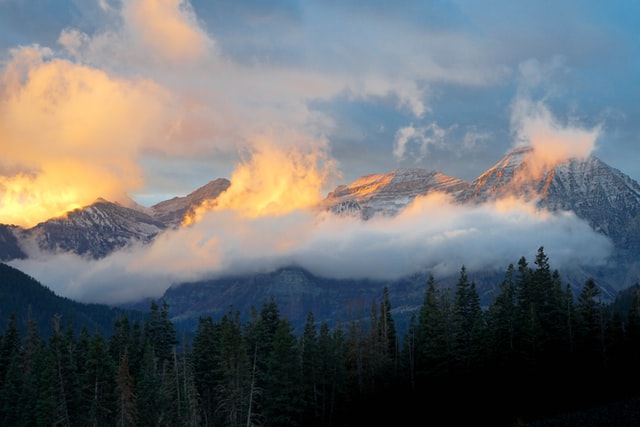To start this assignment, download this zip file.
Working with images

Understanding images
Pixels
- Digital images consist of pixels
- A pixel is a small square, showing a single color
Download and view pebbles.jpeg with an image viewer, zoom in, and see the pixels it uses.
RGB
- each pixel can be controlled using a combination of red, green and blue
- each color ranges from a value of 0 (minimum) to 255 (maximum)
- these colors mix to form the color of the pixel
- visit rgb-explorer to see color mixing in action
The byuimage library
- code we have written to make it easier to work with images
- similar to byubit, but in for images
- visit your CS110 conda environment, and in a PyCharm terminal install this:
conda run -n cs110 python -m pip install byuimageLoading an image
You can load an image from a file and then show it using the code below:
from byuimage import Image
if __name__ == "__main__":
image = Image('mount-timpanogos.jpeg')
image.show()In the zip file for this lesson, you will find a file called images.py. You
can copy the above code and place it there to see how it works. Note that
images.py should be in the same folder as mount-timpanogos.jpeg.
Looping over the pixels
- the pixels in the image are a collection
- this collection is ordered -> they go from left to right and top to bottom
- (0,0) -> (1,0) -> (2,0) …
- (0,1) -> (1,1) -> (2,1) …
![]()
You an loop over all the pixels in an image using a for...in loop:
for pixel in image:
...- In this loop, we now have a
pixelvariable that is set to the current pixel (from top to bottom, left to right)
Changing the color of pixels
You can then change the color of a pixel by setting values for:
- pixel.red
- pixel.green
- pixel.blue
Let’s set the blue and green values in each pixel of the image to 0. This will leave just the red values — the “red channel” of the image
from byuimage import Image
def change_to_red(image):
for pixel in image:
pixel.green = 0
pixel.blue = 0
if __name__ == "__main__":
image = Image('mount-timpanogos.jpeg')
change_to_red(image)
image.show()
Play around with the code
- what about a green channel?
- making all pixels black?
Modifying images
To continue exploring images, here are a variety of ways to modify an image.
Invert the pixels
We can invert the pixels of an image by subtracting their value from 255 (the maximum value).
from byuimage import Image
def invert_pixels(image):
for pixel in image:
pixel.red = 255 - pixel.red
pixel.green = 255 - pixel.green
pixel.blue = 255 - pixel.blue
if __name__ == "__main__":
image = Image('mount-timpanogos.jpeg')
invert_pixels(image)
image.show()
Swap red, green, blue colors
We can swap the red, green, and blue values for each pixel.
from byuimage import Image
def swap_pixels(image):
for pixel in image:
red = pixel.red
pixel.red = pixel.green
pixel.green = pixel.blue
pixel.blue = red
if __name__ == "__main__":
image = Image('mount-timpanogos.jpeg')
swap_pixels(image)
image.show()
Darkening an image
You can darken an image by reducing each pixel by the same fraction:
from byuimage import Image
def darken(image, fraction):
for pixel in image:
pixel.red = pixel.red * fraction
pixel.green = pixel.green * fraction
pixel.blue = pixel.blue * fraction
return image
if __name__ == "__main__":
image = Image('mount-timpanogos.jpeg')
darken(image, 0.5)
image.show()
Grayscale
We can change an image to grayscale by setting every pixel to its average of red, green, and blue:
from byuimage import Image
def grayscale(image):
for pixel in image:
average = (pixel.red + pixel.green + pixel.blue) / 3
pixel.red = average
pixel.green = average
pixel.blue = average
if __name__ == "__main__":
image = Image('mount-timpanogos.jpeg')
grayscale(image)
image.show()Sepia filter
We can change an image to sepia by using a special calculation:
from byuimage import Image
def sepia(image):
for pixel in image:
# calculate sepia values
new_red = 0.393 * pixel.red + 0.769 * pixel.green + 0.189 * pixel.blue
new_green = 0.349 * pixel.red + 0.686 * pixel.green + 0.168 * pixel.blue
new_blue = 0.272 * pixel.red + 0.534 * pixel.green + 0.131 * pixel.blue
# set new colors but be sure we don't go past 255
pixel.red = new_red
if pixel.red > 255:
pixel.red = 255
pixel.green = new_green
if pixel.green > 255:
pixel.green = 255
pixel.blue = new_blue
if pixel.blue > 255:
pixel.blue = 255
if __name__ == "__main__":
image = Image('mount-timpanogos.jpeg')
sepia(image)
image.show()